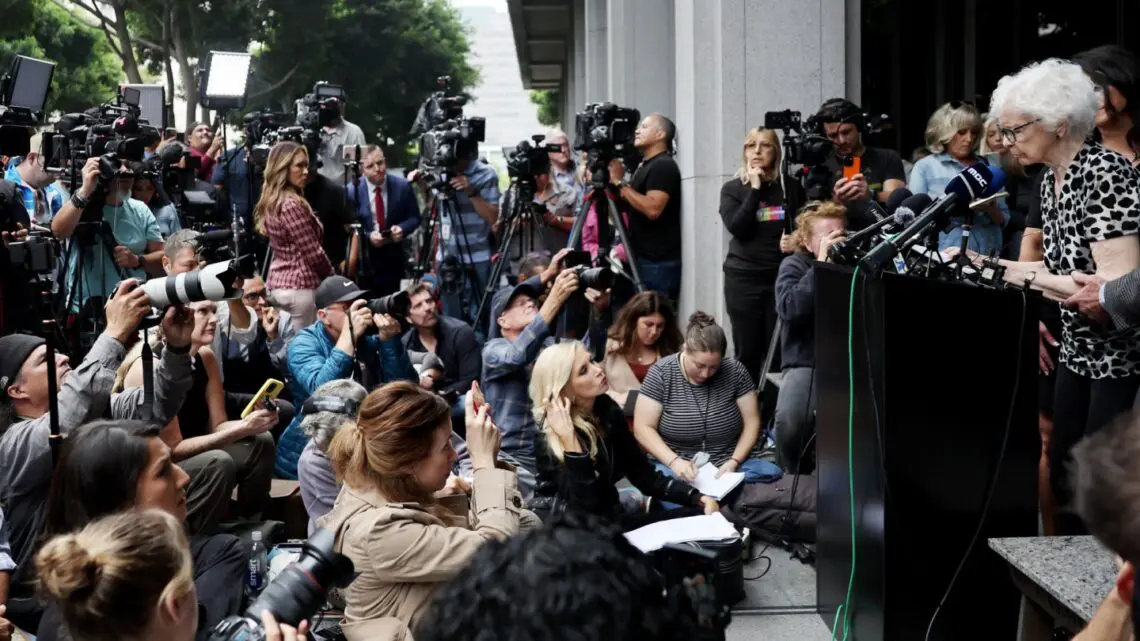Rally at L.A. courthouse reignites Menendez brothers’ case
Iconic courthouse steps see renewed activism
On the steps of the downtown Los Angeles courthouse, a significant revival of interest surged around the case of Erik and Lyle Menendez. Nearly three decades after their conviction for the brutal shotgun slaying of their parents, a fervent plea rang out: “35 years time served. Let them out!”
Spotlight from a polarizing series
Dianne Martin, a devoted follower of courtroom dramas, first discovered the Menendez brothers’ story through a highly controversial nine-part series created by Ryan Murphy. This dramatic retelling of the 1989 murders of José and Kitty Menendez captured her attention, driving her to further explore the case via a recent Netflix documentary.
Martin expressed a distinguished preference for the documentary, asserting, “You don’t know what’s true or not in the series. Watching the documentary, I realized they had such a troubled life at home.” This statement underscores the blurred lines between dramatization and reality that continue to confuse and intrigue audiences.
Uncovering alleged abuse
Martin’s advocacy is fueled by newly surfaced evidence alleging the brothers were victims of horrific sexual abuse by their father, José Menendez, a Hollywood executive. This claim formed the crux of a recent press conference held by the Menendez family, fervently appealing to Los Angeles District Attorney George Gascón to reconsider the brothers’ decades-old convictions.
Mark Geragos, a prominent defense lawyer, pointed to Murphy’s series as a double-edged sword. “The series created such a caricature of the brothers that it spurred a backlash, drawing more focus to their plight,” Geragos remarked.
The impact of Murphy’s series
The aftermath of the series has been significant. Despite family objections to its portrayal, the show attracted millions of viewers and even prompted Kim Kardashian to visit the brothers in prison. This renewed public attention culminated in a two-hour documentary that premiered earlier this month, featuring in-depth interviews with the brothers.
The Menendez convictions have increasingly become a flashpoint, reflecting an era when sexual abuse claims were often overshadowed by allegations of violence. This complex narrative, both polarizing and compelling, has sparked widespread discussions about justice and systemic biases.
Advocate voices gain momentum
According to outspoken supporters like Lupe Delos Santos, the influx of new content about the Menendez brothers has significantly swayed public opinion. “There’s a lot of people supporting them now,” Delos Santos concluded, highlighting the shifting perceptions surrounding the case.
The family’s calculated timing for their announcement aligned with Gascón’s office reopening the brothers’ convictions. Citing new evidence, including a poignant handwritten letter from Erik Menendez to his cousin Andy Cano, they argue that critical details were overlooked during sentencing.
Erik’s emotional note read, “It’s still happening Andy, but it’s worse for me now…Every night I stay up thinking he might come in.” This harrowing correspondence, penned in 1988, is pivotal in their ongoing fight for re-sentencing.
Judicial controversies and public outcry
Lyle and Erik Menendez were infamously convicted in 1996 after a sensational trial that captivated the nation. Their defense hinged on claims of self-defense against their abusive parents, but limited evidence of sexual abuse was admitted in their retrial. As a result, the brothers received life sentences without parole.
Brian Andersen, a cousin of the brothers, lamented their vilification, “Instead of being seen as victims, they were vilified — their father’s sexual abuse ignored.” This sentiment resonates with many who now push for a more nuanced understanding.
Adding new voices to the narrative
Anamaria Baralt, José Menendez’s niece, stressed the importance of re-evaluating the case comprehensively, while Geragos highlighted a declaration from former boy band member Roy Rossello. Rossello’s claims of abuse by José Menendez, if considered earlier, might have drastically altered the trial’s outcome.
The social media explosion
The fervor surrounding the Menendez brothers has permeated social media platforms like TikTok, where numerous creators are dissecting the case. Jessica Palmadessa, a content creator present at the press conference, acknowledged the significant impact of the recent Netflix content. “Nobody was talking about this before,” she emphasized, highlighting how digital media can reshape public discourse.
Lupe Delos Santos, albeit critical of the series, acknowledged, “They didn’t talk about the molestation. They presented them as criminals.” This multifaceted depiction has invited varied interpretations and underscored the complexities of the case.
The Menendez brothers’ saga is a vivid example of how new media can reopen cold cases, shifting public perception and potentially impacting judicial outcomes. Share your thoughts and follow us for updates on this evolving story.

 Italian
Italian







